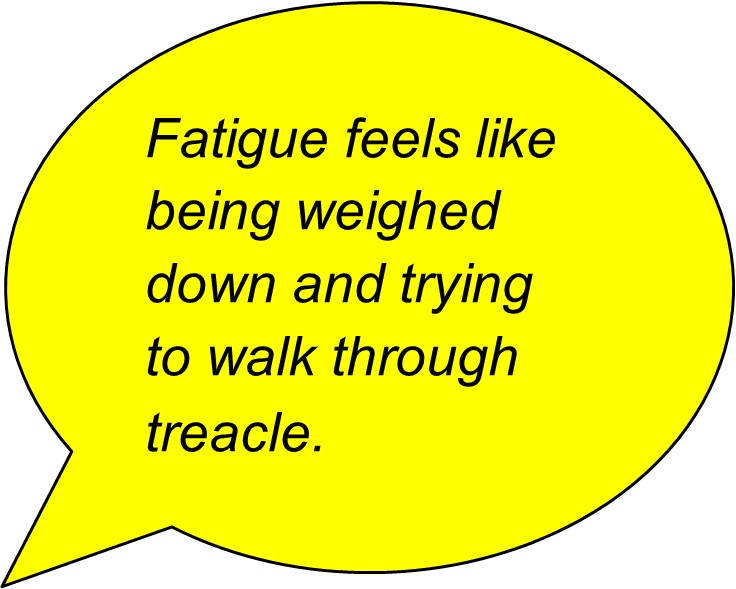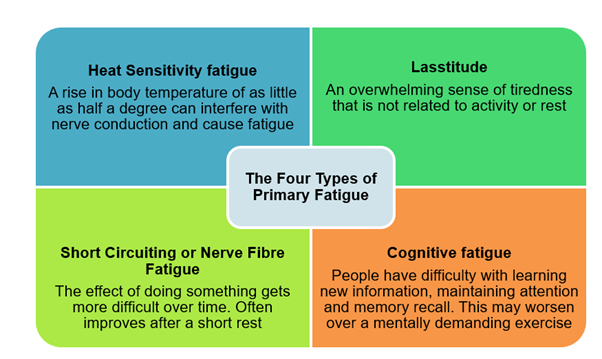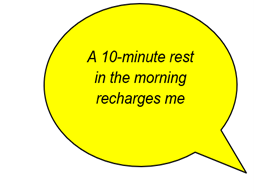Fatigue
What is fatigue?
This is the most common symptom of MS. Up to 86% of people with MS having some level of MS fatigue. It can impact on many aspects of daily life and is described as a feeling of exhaustion that is out of proportion to activity.

MS fatigue is very different from the feeling of being tired or exhausted that people without MS may experience following heavy exercise or a busy day at work.
As an invisible symptom of MS, MS fatigue can be difficult for other people to understand.
MS fatigue is a major cause of stopping working or reducing working hours.
Types of fatigue
Primary fatigue is a type of fatigue caused directly by MS. It happens because the brain and spinal cord have to work around damaged areas to send messages. This takes more effort and energy, so people with MS often feel very tired, even when doing everyday things.
There are four types of primary fatigue.

Secondary fatigue is not directly caused by MS but can impact on fatigue. Things that can make fatigue worse include pain, depression, lack of sleep, anxiety, stress, infection, deconditioning, poor nutrition, or the environment. Some medications may also have side effects of tiredness or drowsiness.
Fatigue Management

Managing fatigue is based around helping people to understand MS fatigue, how to increase energy levels, and how to manage energy in the best way possible. The goal is to help people do as much as they can while living with fatigue. This includes setting goals, using helpful fatigue strategies, and changing unhelpful thoughts that might get in the way.
Top Tips for Managing Fatigue
- Think of yourself as a battery, you need to be kept topped up throughout the day, not to run out of charge
- Take regular rests during or between activities. Rest breaks, top up energy levels. A small 10-minute rest can make a big difference
- A rest means a complete rest, no screens, TV, or social media. Your brain and body need a complete break
- Try and rest before fatigue sets in
- Plan, what needs to be done and what can realistically be achieved
- Try and spread out activities throughout the day, week or month
- Adopt the “Time Not Task” approach, replace task with time, for example replace clean the house with 15 minutes of housework
- Prioritise activities. Focus on the most important tasks
- The 4 D's, Do, Defer, Delegate or Ditch. Sometimes deferring a task by a few hours or days can make a difference. Delegating tasks, asking for help from others
- Save energy and grade tasks. Do tasks in the easiest, most efficient way, such as sitting down to shower or to do food preparation
- Avoid hot baths and showers. Keep cool with fans and cold drinks
- Use mindfulness and relaxation techniques
- Build in routines.
- Adopt the right attitude for change. Be aware of and challenge unhelpful thinking patterns
- Optimise energy levels through healthy eating, staying active, getting enough sleep, reducing stress, and improving mood.
If you feel you would like support with managing your fatigue, then please contact the MS Service helpline or speak to your MS nurse/practitioner and they can refer you to the MS Occupational Therapists for fatigue management education and support.
Useful Links
The MS Trust and the MS Society have useful booklets on fatigue which can be found in the links below.
The MS Society run a very useful online fatigue management course which can be found in the link below.
There is also an excellent MS Trust podcast on fatigue which can be found here: https://www.youtube.com/watch?v=usH5LYmEZD0
See Sleep, Mindfulness and Relaxation sections for more useful information.









